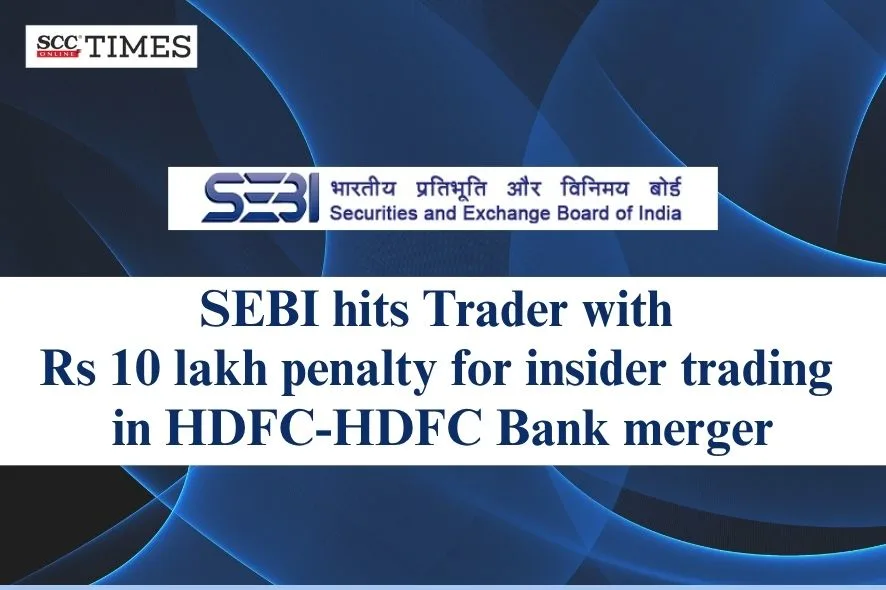Securities and Exchange Board of India: In the proceedings initiated by Securities and Exchange Board of India (‘SEBI’) against a Noticee under Section 15-I of the SEBI Act 1992 (‘SEBI Act’) for alleged insider trading in the scrips of Housing Development Finance Corporation Ltd. (‘HDFC Ltd.’) and HDFC Bank Ltd. during their amalgamation/merger announcement period, Jai Sebastine (Adjudicating Officer) held that the Noticee traded on the basis of the Unpublished Price Sensitive Information (‘UPSI’) in violations of Regulations 3(2) and 4(1) of the SEBI (Prohibition of Insider Trading) Regulations, 2015 (‘PTI Regulations’) and Sections 12A(d) and (e) of the SEBI Act, imposing a penalty of Rs 10 lakh. The Adjudicating Officer reiterated that when a person who has traded in securities has been in possession of unpublished price sensitive information, his trades would be presumed to have been motivated by the knowledge and awareness of such information in his possession.
Background:
On 04-04-2022 HDFC Ltd. and HDFC Bank Ltd. jointly announced to the stock exchanges about an amalgamation/merger, which resulted in their share price increasing by 9.29 per cent and 10.01 per cent, respectively. National Stock Exchange of India Ltd.’s (‘NSE’) analysed the trading activity of various entities in the scrip of HDFC Ltd. and HDFC Bank Ltd. prior to the announcement and observed that the trading of certain clients including Noticee pointed to the possibility of trading on the basis of UPSI.
Consequently, the matter was forwarded to SEBI for investigation which revealed that Noticee, through his HUF account had purchased multiple call options of both HDFC Ltd. and HDFC Bank Ltd. on 01-04-2022, just three days before the announcement and squared off positions on 04-04-2022, yielding significant profits.
SEBI’s examination linked Noticee’s trades to UPSI allegedly passed from X (member of the valuation team at Deloitte and insider) to Y (Noticee’s son and X’s friend) and eventually to the Noticee. Call Data Record (‘CDR’) confirmed frequent call between X and Y, including a meeting on 31-03-2022, just before the trades. SEBI argued that Noticee’s unusual trading in the derivatives, timings of purchases and reliance on his son’s advice established trading based on UPSI. It was further contended that X was part of the valuation team of Deloitte Touche Tohmatsu India LLP (Deloitte) which was appointed by HDFC Bank Ltd. as valuer on 29-03-2022 and he was in possession of information about the merger since 29-03-2022.
The Noticee denied any wrongdoings and contended that the trades in the scrips were undertaken based on the techno-funda analysis and was not based on any UPSI. He further attributed these trades to the fundamental analysis and his past experience in securities market. Additionally, he had provided technical analysis allegedly undertaken by it before executing trades in the said scrips to support his contentions.
Analysis and Decision:
SEBI referred to Kunal Ashok Kashyap v. SEBI, 2021 SCC OnLine SAT 2715, wherein it was held that in case of ‘insider trading’, the evidence could not be direct but circumstantial, since evidence with respect to communication channel might not be on record. SEBI examined the facts and circumstances, concluding that circumstantial evidence established that Y shared a close bond with X, who was an insider and X had met him and communicated over the phone on 31-03-2022. SEBI further observed that the close relationship shared between Noticee, Y and X, the statements recorded during the investigation, CDR analysis, data provided by Telecom Service Providers and trading pattern of the Noticee collectively pointed to the preponderance of probability that the Noticee was having access to UPSI while undertaking trades in the scrips of HDFC Ltd. and HDFC Bank Ltd.
SEBI emphasised that Y in his statement had feigned complete ignorance about the trades executed by Noticee in the scrips of HDFC Ltd. and HDFC Bank Ltd. on 01-04-2022, which clearly showed that no technical analysis was undertaken by either Y or Noticee before the impugned trades were executed by the Noticee. SEBI further noted that the sharp price rise in the scrip of HDFC Bank Ltd. and HDFC Ltd., i.e., 10.01% and 9.29% respectively, was solely attributable to the UPSI and such price rise was unprecedented. SEBI highlighted that if the said UPSI had not been disclosed on the day the prices moved up phenomenally, i.e., on 04-04-2022, the Noticee would have undoubtedly lost the premium it paid for the purchase of call options in the scrips of HDFC Ltd. and HDFC Bank Ltd.
SEBI noted that the Noticee procured UPSI from X through Y without any legitimate purpose and bought call options of HDFC Ltd. and HDFC Bank Ltd. on 01-04-2022, while in possession of UPSI, and exited on 04-04-2022, after the merger news was disclosed. Considering X’s close friendship with Y, proximity of calls, meetings, trading dates, investigation statements, Y’s role, and the Noticee’s unusual trading pattern, it was established that the Noticee violated Regulations 3(2), 4(1) of the PIT Regulations and Sections 12A(d), (e) of the SEBI Act.
SEBI, therefore, concluded that the Noticee was liable for payment of monetary penalty in terms of Section 15-G of the SEBI Act. Though there was no material available on record to indicate that the violations committed by Noticee were repetitive, so therefore SEBI considered the profit made by the Noticee while trading in shares of HDFC Ltd. and HDFC Bank Ltd, imposing a penalty of Rs 10 lakh to be paid/remitted within 45 days of receipt of the order.
[In the matter of suspected insider trading activity of certain entities in the scrip HDFC Ltd. and HDFC Bank Ltd., 2025 SCC OnLine SEBI-AO 34, dated 29-07-2025]


